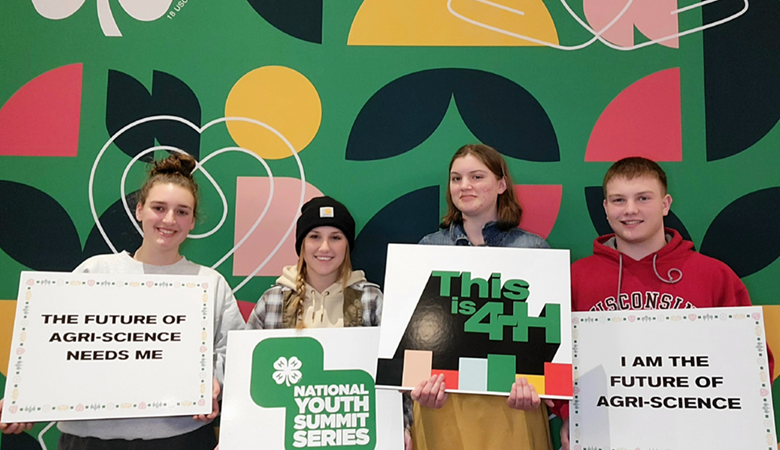The 4-H Lead to Change experience prepares youth to address agricultural challenges in their community
In a rapidly changing world where the supply chain and global production of food face new challenges, it’s critical we cultivate the next generation of leaders in the agriculture industry. These young champions will be the ones who fuel the discovery of new solutions and solve big challenges in human health, agriculture, and food. A team of local, youth innovators including Maria Lee (Ozaukee County), Emily Stumpf (Outagamie County), Brice Thiel (Wood County), and Morgan Waski (Green County), recently got the chance to hone and test their skills at the National 4-H Youth Summit on Agriscience.

The three-day Summit, held in Bethesda, MD this past March, immersed Morgan, Brice, Emily, and Maria in a variety of agriscience topics relevant to today’s agriculture including soil health, animal biosecurity, agribusiness, precision farming, and “agvocacy.” Attendees made up of youth from across the country had the opportunity to build their skills in workshops led by a number of industry leaders and mentors.
As part of the Summit youth participated in the 4-H Lead to Change experience, where teams of youth were challenged to address an agricultural-related issue in their community. Together teams developed a plan and then pitched their ideas, live, to mentors from the ag industry. A total of 12 teams across the country were selected to receive a $2,000 grant to help put their projects into action.
The Wisconsin delegation’s Lead the Change, Bugging Out with WI 4-H, focuses on pollinator education and the importance of creating and maintaining habitats for native pollinators. After attending a session at the National 4-H Ag Summit, the team was inspired to research more about the pollinator population in Wisconsin. The team focused on pollinators because the decline in native pollinator populations affects nearly all facets of agriculture. From the food on our table and animal feed, to the air we breathe, they all are affected if we do not have a thriving pollinator population.
To address this challenge, the team partnered with UW-Madison Extension’s Horticulture Program and the Wisconsin 4-H Virtual Learning Community to offer hands-on learning kits with a virtual learning session. The kits features The Pollinator Activity Pack supplies all materials for the following activities: for a pollinator seed pod, insect hotel, paper folding, materials and workbook, full color Wisconsin Bee Identification Guide, Wisconsin Celebrates Pollinator Week drawstring bag and logo sticker, pollinator scavenger hunt card, steps to mimic the bee waggle dance, and instructions to access the statewide BioBlitz through the iNaturalist smartphone app, and access to a virtual learning session on Thursday, June 20th of National Pollinator week. The cost is $15 per pack plus shipping. For more information on ordering, please visit https://hort.extension.wisc.edu/pollinator-week. .In addition, the team plans on raising monarch butterflies and documenting their growth and the importance of pollinators with a multi-week social media series. The team plans to continue working on the pollinator project as part of a growing effort with other youth members, University of Wisconsin Extension Staff members, and other interested community partners.
About 4-H
4-H, the nation’s largest youth development organization, grows confident young people who are empowered for life today and prepared for careers tomorrow. 4-H programs empower nearly six million young people across the U.S. through experiences that develop critical life skills. 4-H is the youth development program of our nation’s Cooperative Extension System and USDA and serves every county and parish in the U.S. through a network of 110 public universities and more than 3000 local Extension offices. Globally, 4-H collaborates with independent programs to empower one million youth in 50 countries. The research-backed 4-H experience grows young people who are four times more likely to contribute to their communities; two times more likely to make healthier choices; two times more likely to be civically active; and two times more likely to participate in STEM programs.
Learn more about 4‑H at 4-H.org and follow us on Facebook, Instagram, and Twitter.



